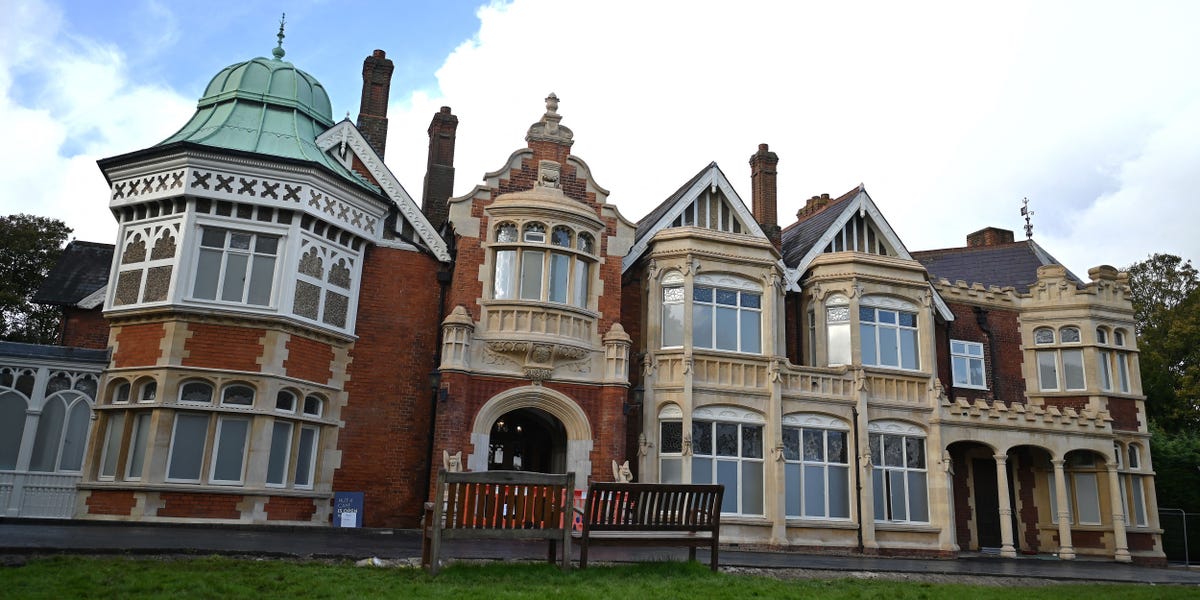- Around 100 world leaders, tech bosses, and AI experts will attend the AI Safety Summit this week.
- It’s being held at Bletchley Park in England.
- This was home to top codebreakers like Alan Turing during World War II.
Elon Musk, Sam Altman, and Kamala Harris are among the roughly 100 people who will descend on a small town 50 miles north of London for the AI Safety Summit on Wednesday.
It’s the brainchild of Prime Minister Rishi Sunak, a former Goldman Sachs analyst and hedge fund partner who’s eager to position the UK as a leader in the tech sector.
The chosen location for the two-day conference has a special association with the man considered by many to be the father of modern computer science, Alan Turing.
Before 1938, Bletchley Park was a mansion in the Buckinghamshire countryside built for a politician during the Victorian era.
But it entered the history books after it was purchased by a director of MI6 and became the center for the UK’s top codebreakers, like Turing, during World War II.
Those working in AI will be familiar with the Turing test, which is designed to distinguish humans from machines. The CAPTCHAs you see on websites to prevent spam are a modern example of this. But with the rise of AI, more complicated Turing tests will be needed.
In a speech on Monday about the summit, the UK’s minister for science and technology, Michelle Donelan, said the rise of AI means “we stand at a pivotal juncture in human history.”
“What Alan Turing predicted many decades ago is now coming to fruition,” she said, referring to his research into machine learning.
“Machines are on the cusp of matching humans on equal terms in a range of intellectual domains — from mathematics to visual arts through to fundamental science,” she added.
However, doubts have been raised as to whether the summit will actually achieve a framework to promote AI safety.
One of the invited executives, Connor Leahy of AI safety research group Conjecture, suggested that government leaders could agree to minimal regulation that allows powerful AI to develop unchecked, The Guardian reported.
And while the UK is home to Google DeepMind, the US is the primary leader in AI.
Turing devised the eponymous test in a 1950 paper, written while he was an academic at the University of Manchester, and sworn to secrecy for his key role in defeating the Nazis.
At Bletchley, he was part of a team trying to decipher the Enigma naval machine that was used by the Nazis to encrypt communications.
It had initially been cracked by Poland in the early 1930s, before the Germans increased security by changing the system daily.
Turing designed a machine, called the Bombe, which performed codebreaking techniques faster than a human.
His work on cryptography contributed to the design of Colossus, considered to be the world’s first programmable electronic computer, which was used at Bletchley to crack another high-grade cipher called the Lorenz.
“What happened at Bletchley Park eighty years ago opened the door to the new information age,” Donelan said.
Seven years after the war ended, Turing was convicted of “gross indecency” as homosexuality was illegal at the time.
He was subjected to chemical castration instead of going to prison, and was found dead from cyanide poisoning in 1954. An inquest determined it was a suicide, though this has been questioned by some since.
Turing has since become a national hero, not just for his role in computer science and defeating the Nazis, but also for LGBTQ+ rights.
He was posthumously pardoned in 2013. Since then, men and women cautioned or convicted under historical homosexuality legislation were pardoned under what is known as the “Alan Turing law.”
Today, Bletchley Park is also home to the National Museum of Computing.
So as the biggest names in AI and government leaders come to Bletchley – it’s not only fitting for its role in computer science – but also for Sunak’s aim to showcase the UK’s work on AI and position it to influence its future.
Read the full article here





